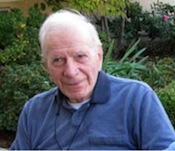
James Vlamis, a retired plant physiologist in the Department of Plant and Soil Biology and at the Agricultural Experiment Station at the University of California, Berkeley, died in May 2012 at the of age 97. He earned his undergraduate and doctorate degrees from UC Berkeley, where he met his future wife, Nancy MacBride. He was hired by the Harvard Forestry School in 1941, but his new life with Nancy was severely altered by WWII, as were so many other lives.
Dr. Vlamis served in the United States Army Air Corps with the First Air Commando Group in the China-Burma-India triangle. After the war he was hired by Berkeley’s Department of Soils and Plant Nutrition, which later became part of the Department of Environmental Science, Policy, and Management. There he began a career of research fully exemplary of scientists in the land grant universities, where scientific understanding of the natural world and its application for human welfare was and is a key value.
Much of his research was centered on plant response to the complexity of soil chemistry. His studies in the greenhouse and the field dealt with such diverse subjects as the effect of copper on rice production, nitrogen fixation in wildland plants, the calcium-magnesium ratios in serpentine soils, manganese and silicon interaction in grasses, growth and phosphate uptake by pine seedlings grown on phosphate deficient soils, and many other soil-plant interactions.
Continuing UC Berkeley’s distinguished history of research in mineral nutrition in plants, which goes back to professor Dennis Hoagland's pioneering work on ion uptake, Dr. Vlamis and his colleagues carried the research from the laboratory to the greenhouse, agriculture fields, nurseries, and wildlands. Dr. Vlamis’ attention to the soil-plant relationship was most productive, beginning with his early research with soil science professor Hans Jenny. In one of their early collaborations, Vlamis introduced a novel scheme of mixing ion exchange resins in soil to obtain a desired chemical balance.
He and his colleague Dr. D. E. Williams conducted a long-term study of trace element accumulation, movement and distribution in the soil profile following massive applications of sewage sludge, accompanied by greenhouse pot studies. Such studies provide important guidelines for the application of sewage sludge to land, and emphasize the need to characterize chemically the nature of the applied material.
In 1962 Dr. Vlamis received a Fulbright Scholarship to assist with rice problems in Portugal. He retired in 1981, but continued working daily into his 90s in the greenhouse, where he conducted experiments and assisted students and farmers. Agriculture, forestry, ecology, and resource conservation have benefited greatly from Dr. Vlamis' research. He expressed his value for life not only through his work with plants, but by advocating for working people and against imperialist wars.
He was preceded in death by Nancy, his wife of 68 years, their only son, Michael, and five siblings. Daughters Pauline, Catherine, and Barbara remain as well as numerous friends and members of his extended family.
A celebration of life will be held October, 28, 2012 in Berkeley. To attend, please contact the family at barbarav28@gmail.com. In lieu of flowers/plants, consider a donation to the Michael James Vlamis Graduate Student Support Fund (https://givetocal.berkeley.edu/egiving/index.cfm?Fund=FW5579000) or the Monthly Review Foundation (http://monthlyreview.org/press/support-monthly-review/).
–By Barbara Vlamis and Dr. Larry Waldron
